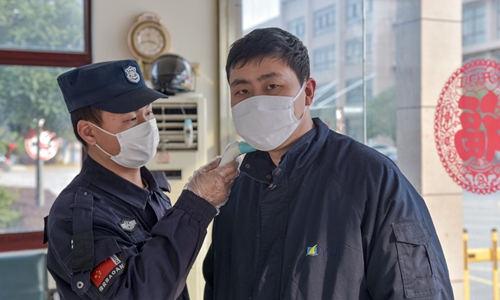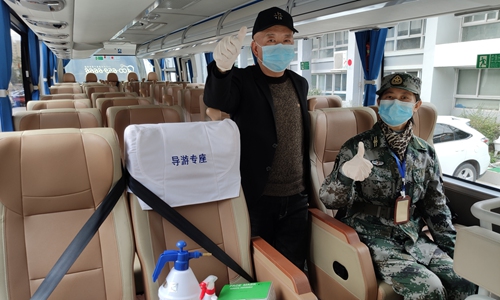HOME >> CHINA
Chinese governments and employers protect migrant workers, disproving New York Times’ slander
By Huang Lanlan Source:Globaltimes.cn Published: 2020/2/26 6:21:55

An employee of Changxing Kibing Glass has his temperature checked. Photo: Courtesy of Changxing Kibing Glass
Chinese employees, enterprises and regional governments have slammed a New York Times article, which claimed the country's migrant workers are "discriminated against" and getting little help during the novel coronavirus COVID-19 outbreak.
In its article Coronavirus Lockdowns Torment an Army of Poor Migrant Workers in China, the New York Times groundlessly claimed that migrant workers are banned from entering cities and are turned down by employers amid the epidemic, which is contrary to the facts, some workers told the Global Times.
Du Tian, a staffer with glass manufacturer Changxing Kibing Glass (Kibing) based in East China's Zhejiang Province, took a free high-speed train back to his company on February 21 from his hometown in neighboring Anhui Province. This special train was arranged by the Zhejiang government to transport migrant workers back to their workplaces in the province.
"I was so excited when my company told me about [the free special train for migrant workers]," Du told the Global Times Tuesday. "It was very considerate and heartwarming."
Transporting to work

A tour bus that Tengqiao town arranges to transport migrant workers. Photo: Courtesy of Zhejiang Romantic International Tourist
Regional governments across China are endeavoring to pick up migrant workers with free trains and buses as an increasing number of companies have resumed work since the epidemic is coming under control.
Authorities in Zhaotong city of southwestern Yunnan Province, for instance, arranged a special train to transport its 1,385 workers to their companies in Dongguan, South China's Guangdong Province on Monday, Zhaotong Daily reported.
In Henan, one of China's leading labor-intensive provinces, the government had organized 2,672 trains and buses for 73,000 workers by February 23, according to the website of the Department of Human Resources and Social Security of Henan Province.
China's transport authority has eliminated road tolls for vehicles picking up migrant workers. Zhejiang Romantic International Tourist, a travel agency based in Zhejiang's Tengqiao town that works with local government in transporting workers on its tour buses, confirmed to the Global Times that it hasn't paid any highway or bridge toll fees.
Since February 19, the agency has brought back some 400 employees to the town's clothing and eyeglass factories from other provinces including Hunan, Guizhou and Sichuan. "A round trip to Sichuan cost four days," said the agency's general manager Li Zhirong.
Migrant workers who had traveled a great distance to the town received a warm welcome, Li said. "When they arrived, our town mayor greeted them in person and gave them red packets (gift money)," she recalled.
Li praised local authorities' and employers' efforts in bringing non-local employees back during the epidemic. "Passengers don't have to pay their fares," she told the Global Times Monday. "The government covers two thirds of the cost and employers cover the rest."
Treat them as treasures
During the fight against the virus, many Chinese employers have been doing their best to protect their employees instead of abandoning them as suggested in the New York Times' article.
Contrary to the scenario of various sectors ordering their employees to stay home "usually without pay" as the New York Times portrayed, numerous employers have promised to pay salaries the same as usual.
Lacesar Pizzaria, a Shenzhen-based pizza chain with 140 branches across the country, said that its frontline workers even get a 30 percent raise in their hourly wages amid the epidemic. "I want them to feel that their hard work in the special period deserves a reward," the firm's founder Chen Ning told the Global Times in an interview last week.
Kibing gives its employees their pay on time and in full, said its administration director Xu Jie. Migrant workers in traffic-controlled Hubei Province (epicenter of the epidemic) who are not able to come back for work also get paid, he added.
Xu said he was confused by the person whom the New York Times' article described as going "from factory to factory in southern China begging for a job" but being repeatedly turned down.
"In fact, many companies are facing a labor shortage," Xu told the Global Times Tuesday. He explained that since China's relatively less developed central and western regions are gradually improving, many local people tend to find jobs in their hometowns instead of going elsewhere.
"Therefore, rather than rejecting migrant workers, we are trying hard to attract them with better terms," he added.
According to a recruitment advertisement that Kibing posted on the internet on Monday, jobs such as smelters and wiremen and bench workers can be paid 4,000 to 5,500 yuan ($570-$783.7) a month apart from social insurances, housing provident funds and paid annual leave.
Xu was skeptical about the authenticity of the job-begging person in the New York Times' article. "I think cases like that would only have happened a decade ago," he said. "Governments and enterprises in developed areas treat migrant workers as treasures nowadays."
Tengqiao town authority agreed. To ease local companies' labor shortages, the town has organized recruitment activities in the areas where it picked up employees, said a publicity official Xu Xinxian.
Moreover, the town had cooperated with local landlords and had arranged 1,138 flats for migrant workers whose companies had no dormitories by February 22. "These flats are qualified in virus prevention and fire control," Xu told the Global Times Monday, disproving the New York Times' report that claimed migrant workers were "kicked out of their apartments" by landlords.
"The [New York Times'] article was biased," Kibing's Du commented. "I feel as if its writer was eager to create panic."
Posted in: SOCIETY